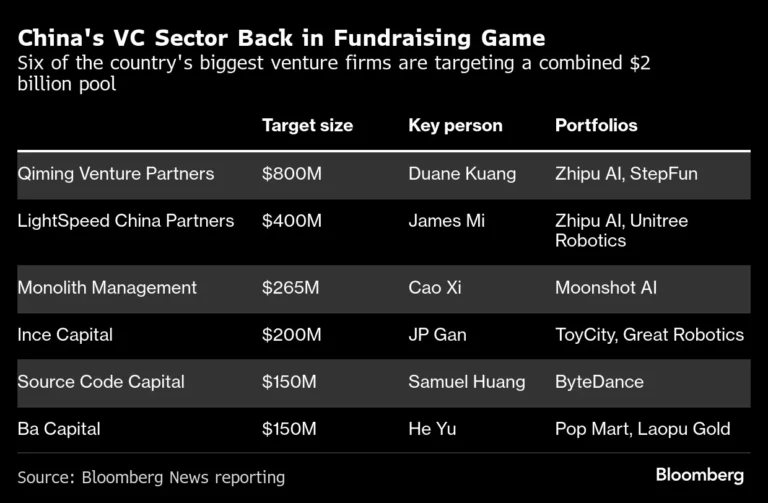China’s largest venture capital houses are tapping the market for at least $2 billion in new funds, re-engaging with the country’s startups in a signal of renewed global investor interest in areas from AI to toys.
At least six of the country’s most prominent VC firms are creating new dollar-denominated funds, designed to allow overseas investors to pool bets on Chinese companies. LightSpeed China Partners, known for backing Meituan and PDD Holdings Inc. in their early days, is targeting at least $400 million for a fund focusing on deep tech, according to people familiar with the matter.
Monolith Management, which backs DeepSeek-rival MoonShot AI, is looking to start a second fund of at least $265 million, according to people familiar, who asked not to be named because the matter is private. Pop Mart International Group-backer BA Capital is raising another $150 million, the people said. Ince Capital, co-founded by former Qiming managing partner JP Gan, is seeking $200 million, the people said. They join Qiming Venture Capital, which began raising an $800 million fund earlier this year, Bloomberg News has reported.
China’s VC Sector Back in Fundraising Game
Six of the country’s biggest venture firms are targeting a combined $2 billion pool.
Together, they represent a wave of fundraising that hasn’t been seen among Chinese VCs for years. It’s unfolding as global investors reassess the country’s startup landscape and broader economy, which are showing signs of revival after years of Covid-era stagnation and regulatory headwinds.
Much of that resurgent interest can be traced to the rise of breakout AI stars like DeepSeek and Manus, which has galvanized local entrepreneurs. At the same time, brands such as Laopu Gold Co. and Pop Mart — maker of the wildly popular Labubu collectibles — are winning both consumers and financiers.
The pace of fundraising remains a far cry from the industry’s peak, before China’s 2020 internet sector crackdown. Investors remain wary about the long-term outlook of the country, while US endowments have retreated due to troubles at home and concerns about geopolitical tensions with China, the people said. Washington remains extremely sensitive in particular to sectors like semiconductors and AI.
The fundraising plans are preliminary and subject to change, the people said. Representatives for LightSpeed China, Monolith, BA Capital and Ince didn’t provide comment on their fundraising.
In public markets, Hong Kong has emerged as one of the world’s busiest listing destinations this year, hosting $33 billion worth of share sales from bubble tea chains and toy brands to electric vehicle suppliers. Candidates waiting in the wings include some of China’s hottest large-language model makers and fashion giant Shein.
That IPO surge is mirrored to some extent in private markets. Global sovereign wealth investors managing $27 trillion in assets are increasingly bullish on China’s tech sector because they don’t want to miss out on the next waves of innovation, according to an annual survey by Invesco Asset Management. And more US investors including Benchmark and Capital Group have made exploratory trips to China in 2025.
LightSpeed China, founded by James Mi, a former deals chief for Google’s Asia operation, is one of several high-profile venture firms that helped seed China’s modern tech industry.
Monolith, co-founded by Tim Wang and HSG (Sequoia China) alum Cao Xi, has attracted enough interest to likely meet or surpass their target, the people said. The firm is deliberating a final target size. It closed a debut US-dollar fund at $264 million in 2023, according to trade publication AVCJ. Cao is known for his early bets on Kuaishou Technology, Douyu International Holdings Ltd. and Tencent Music.
Other Chinese venture outfits considering raising funds this year include Xiaomi Corp. co-founder Lei Jun’s Shunwei Capital, the people said. It’s not immediately clear how much they may target. Source Code Capital, among the earliest backers of TikTok owner ByteDance Ltd., has also been seeking about $150 million, people familiar said in February.
Representatives for Shunwei didn’t provide comment on their fundraising.


